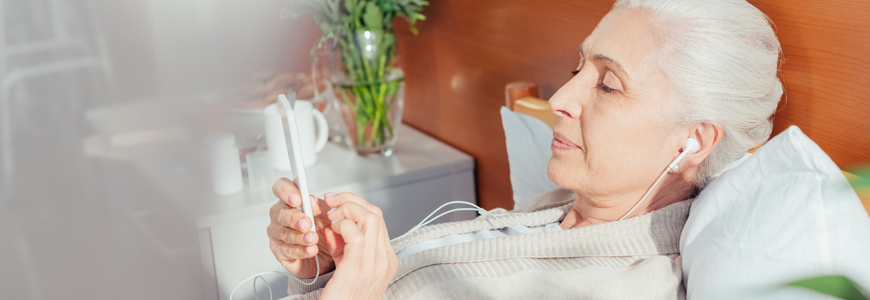Duke geriatric medicine specialists are implementing personalized music programs at Duke hospitals and studying the effects of music on patients’ perception of pain control and overall satisfaction while hospitalized. Studies have shown music to be beneficial in managing pain and anxiety in perioperative patients. Additionally, for patients in nursing homes and long-term care facilities who have dementia, Parkinson’s Disease, and other cognitive impairments, listening to music has long been known to improve responsiveness and memory.
As part of Duke’s Perioperative Optimization of Senior Health (POSH) program, a quality improvement project was implemented to evaluate an inpatient, postoperative, personalized music program for older adults undergoing elective surgeries. A report on the project was published in 2019 in the Journal of PeriAnesthesia Nursing, concluding that program participants perceived improved mood and pain control, were satisfied with their hospital experience, and had lower rates of incident delirium.
“As a result of music interventions, we’ve seen patients in nursing homes ‘come alive,’ becoming more responsive in end-stage dementia and having some improvements in memory, such as remembering names or remembering the words to a favorite hymn,” explains geriatric medicine specialist Neema Kapadia Sharda, MD, who was the project report’s lead author. “A lot of work has been done surrounding the use of music in the perioperative time period, suggesting a reduction in anxiety, heart rate, blood pressure, and cortisol levels. The idea behind our project was to look at music’s influence on perceived pain and anxiety in the postoperative period; many of our patients had some degree of cognitive impairment.”
The project team started by asking patients for their favorite songs, artists, or music genres, engaging family members to help with the lists. Songs were downloaded on a device provided by the hospital if patients didn’t have their own, and headphones were provided for patients to use in the hospital and take home after discharge to encourage them to continue the music program to aid in their recovery. Most participants listened to music for less than three hours per day while hospitalized.
Results from the project:
- 81.1% of the respondents reported that the music intervention had a positive or very positive effect on their mood.
- Of the participants who reported experiencing pain, 61.3% reported that the music intervention had a moderate or major effect on modulating that pain.
- 97.4% of the respondents reported that they were satisfied or very satisfied with their hospital experience.
- 89.5% of the respondents reported that they were likely to continue listening at home as a part of their recovery.
“One interesting thing to note about our findings is the importance of personalization—the music has to mean something to provoke autobiographical memories for patients and have positive effects,” Sharda reports. “These results really speak to the power of the music.”
In the age of COVID-19, says Sharda, with visitors often limited and patients isolated from their families, older adults with cognitive impairment may experience delirium, or have difficulties eating without family members there to remind them. For these patients, music can be a way for staff to connect with them in the absence of their loved ones.
Another natural benefit of music is its nonpharmacological nature. “We know that medications can often cause trouble for older patients; we’re becoming more and more aware of their harmful effects and looking for alternatives,” says Sharda. “Because it’s such an obvious tool, we sometimes don’t even think about how beneficial music can be.”
Although a music intervention program is simple to implement in hospital settings, Sharda notes that a culture change is required in order for it to take hold. The entire care team must recognize the program’s value and be willing to support it as a way to implement personalized care in a multidisciplinary fashion.
“An inpatient, personalized music program is a feasible, inexpensive, evidence-based intervention that can be implemented with minimal additional hospital resources when adequate attention is given to workflow and culture change,” she says.
